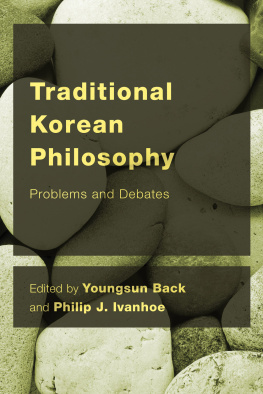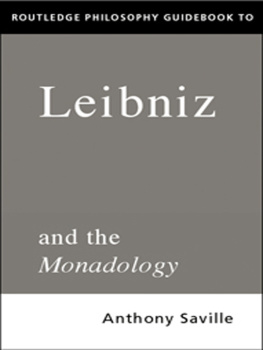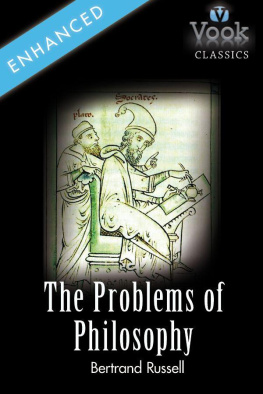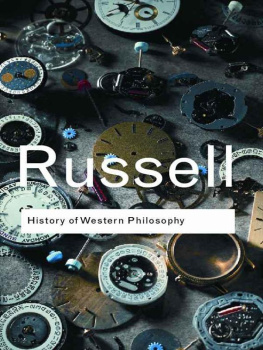THE FUNDAMENTAL PROBLEMS OF WESTERN METAPHYSICS
Xavier Zubiri
Translated by Joaqun Redondo
Translation Critically Revised by Thomas Fowler
This translation was made possible by a grant
from the Spanish Ministry of Culture

Copyright 2010 by
University Press of America, Inc.
4501 Forbes Boulevard
Suite 200
Lanham, Maryland 20706
UPA Acquisitions Department (301) 459-3366
Estover Road
Plymouth PL6 7PY
United Kingdom
All rights reserved
Printed in the United States of America
British Library Cataloging in Publication Information Available
Library of Congress Control Number: 2009936082
ISBN: 978-0-7618-4877-6 (paperback : alk. paper)
eISBN: 978-0-7618-4879-0
Co-published by arrangement with
the Xavier Zubiri Foundation of North America
 The paper used in this publication meets the minimum requirements of American National Standard for Information SciencesPermanence of Paper for Printed Library Materials, ANSI Z39.48-1992
The paper used in this publication meets the minimum requirements of American National Standard for Information SciencesPermanence of Paper for Printed Library Materials, ANSI Z39.48-1992
The Fundamental Problems of Western Metaphysics is a translation of Los problemas fundamentales de la metafisica occidental, published by Alianza Editorial/Fundacin Xavier Zubiri, Madrid, 1994. This translation is published by agreement with the publisher and copyright holder of the Spanish original.
CONTENTS
TRANSLATORS INTRODUCTION
This book introduces the profound reflections of Xavier Zubiri (1898-1983) on the history of philosophy to English-speaking audiences. As a philosopher who in many ways rethought all of philosophy and much of theology, Zubiri felt it necessary to be in continuous dialogue with earlier thinkers. The present work and others that he wrote dealing with the history of philosophy stem from that need, and show how seriously Zubiri took all philosophers and philosophical systems. The theme of the book is the transcendental in Western philosophy, and how a firm grasp of it reveals underlying unity in the philosophers considered, but also fundamental problems that Zubiri believes require a complete rethinking of certain basic notions and theories. Zubiri sketches this in the Conclusion; a thorough treatment may be found in his major work, Sentient Intelligence.
In this Translators Introduction we shall not attempt to summarize the book; that is done briefly in the Editors Introduction, and in any case Zubiris own text speaks quite eloquently, so little in the way of summary is required. Nonetheless we may observe that in some respects the presentation (and the selection of philosophers) may seem strange to a culture steeped in the empiricist tradition, as is that of the Anglo-Saxon world. Hegel, for instance, is rarely taken seriously any longer in that world. Zubiri, however, shows how Hegels thought is indeed part of a tradition with a unity that is key to a deep understanding of Western philosophy. Accordingly, we believe that many will find Zubiris point of view, the depth of his analysis, and the breadth of his thought quite refreshing and insightful.
This is a very serious book that will require some effort on the part of the readereffort that will be repaid in terms of new insights into philosophy and metaphysics. The book is not an introduction to metaphysics or philosophy, intended for beginners. Its audience is that group of people who have a serious interest in the history of philosophy and the fundamental problems that have driven it for two and a half millennia.
With respect to the translation itself, we have stayed close to the original Spanish text, while at the same time attempting to produce a readable English version. But as any student of philosophy is aware, there are hard limits to this task, especially in the case of a philosopher whose ideas are very radical and original, and who consequently must utilize many neologisms and employ words in an almost poetical fashion with respect to their meaning. To assist the reader, English neologisms have been kept to a minimum, and footnotes are used to explain terms and concepts that might not be immediately clear to those in the English-speaking world. Pleonasms (common in Spanish) have been removed, and in some cases repetitive sentences (of the type used for emphasis in oral presentations) have been deleted as such repetition sounds odd and can be confusing in printed English text. To facilitate reference back to the original Spanish edition, the pagination of that original is indicated by numbers in curly braces, e.g., {25}.
EDITORS INTRODUCTION
The present volume is the seminar Los problemas fundamentales de la metafisica occidental [The Fundamental Problems of Western Metaphysics], which Zubiri gave in twelve sessions during the academic year 1969-1970 at the Sociedad de Estudios y Publicaciones, Madrid. It belongs, therefore, to the period when Zubiris thought had reached its maturity.
A few months earlier, in March of 1969, Zubiri had given a brief seminar in two sessions entitled Estructura de la metafisica [Structure of Metaphysics], which is a preparation for and complement to the one published here. That seminar consists of two parts: an historical first part, which presents in a very compressed way the same historical material covered in the present text, and a systematic second part, which presents in greater detail what will be covered in the last chapter of the present work.
The seminar we present here has several peculiarities. Although Zubiri held the chair of History of Philosophy from 1926 to 1942, the dominant tone and basic objective of his enterprise has a distinctive theoretical accent, something that is ever more patent in his mature works. It is true that in our time the great majority of theoretical philosophies are accompanied with {ii} developments and perspectives confronting earlier philosophiesat least some of the issues considered importantand Zubiri is no exception. In his theoretical works we find numerous historical references, but in that context very schematic references almost always appear as critical differences with respect to his own thought. In this sense, Zubiris references tend to return over and over to a few authors, and they do so with such determination that it seems to suggest an interpretation of the history of philosophy different from the usual one. The present seminar could also be understood as the explicit presentation of those interpretations and therefore as an elaboration and ground of what in the theoretical works appear as schematic references.
With the title Cinco lecciones de filosofia [Five Philosophy Lectures], Zubiri had published another seminar in 1963. In it he analyzed several historical variations of the concept of philosophy in some important philosophers, such as Aristotle, Kant, Comte, Bergson, and Husserl (with some additions on Dilthey and Heidegger), a selection that Zubiri himself considered absolutely arbitrary. That arbitrariness does not appear to concern the importance of the chosen authors, but rather the incompleteness of the selection, since in the last prologue (1980) that Zubiri wrote for that work he said, An adequate exposition should cover many other thinkers. Actually, in one of my other seminars I have attempted to add four other authors to the five covered in this present work: St. Thomas, Descartes, Leibniz, and Hegel. Perhaps some day I may decide to publish these studies.
Zubiri clearly refers to the seminar that we now present, the continuity of which with the previous one is established {iii} by the author. This means that the present seminar has an expository level and in it Zubiri develops what he deems central in the thought of six authors whom he considers quite important at different stages of Western thought. The techniques of his exposition are common. Taking as a guide a central text of an author there is an effort to present the structural coherence of the authors thought. Here again we find the great expository qualities of Zubiri that unite both clarity and maximum rigor. Those qualities, which garnered so many readers for











 The paper used in this publication meets the minimum requirements of American National Standard for Information SciencesPermanence of Paper for Printed Library Materials, ANSI Z39.48-1992
The paper used in this publication meets the minimum requirements of American National Standard for Information SciencesPermanence of Paper for Printed Library Materials, ANSI Z39.48-1992